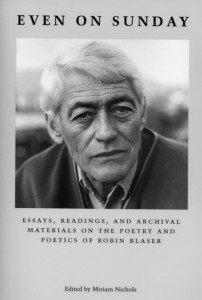By Miriam Nichols
Have you ever wondered how biographies get written? Where the material comes from before somebody writes a Wikipedia entry?
I have been working on a biography of the poet Robin Blaser for a good two years–longer if you count the summons I’ve received from his various friends and colleagues, instructing me to interview them quickly because they are fading.
Robin Blaser (1925 – 2009) was an important poet of the mid-20th century. He began his writing life in Berkeley, California and then immigrated to Vancouver in 1966 to teach at brand new Simon Fraser University. Blaser was a contributor to a new kind of postwar poetry we now think of as postmodern and his particular project within that larger one was to find a way to write about religious feeling in a secular era.
I am writing a literary biography of Blaser which means that I have to account for his principal works as well as his life. That life is scattered through dozens of bankers’ boxes in Special Collections at SFU and at the Bancroft Library, University of California at Berkeley. There are letters, lecture notes, advertisements for events, notebooks, financial records, reading lists, school records, CVs, student essays, and pictures.
 Photo Credit: shehan365 via Compfight cc
Photo Credit: shehan365 via Compfight cc
I have been very fortunate in having a number of UFV students to help me organize all that into a chronology. Their work is essential to the project. There are also the 35 live interviews I’ve conducted of people who knew him and worked with him. My job is to draw a narrative out of this welter of information and then relate it to his writings.
What I can tell you about the process is that biography, like histories of events, is always subject to chance and open to revision. What got put in the boxes was sometimes quite arbitrary and what I take from the boxes is going to be filtered through my point of view.
Am I saying that biography is wholly subjective? No, not really, because I am bound by documents and interviews I didn’t create. Is it then objective? No, again, because I am selecting from the available materials and when I create narrative out of them, I am inevitably spinning the documents.
So there you have it. History is the view from here, or as Blaser says in a little poem called “Giant,” “you’re somewhere less than perfect, / but reading the story” (Holy Forest 310).


Comments are closed.